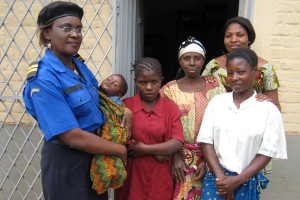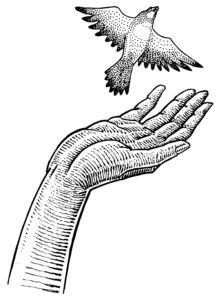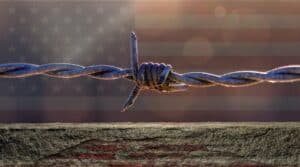
While rape has been a horrific companion to most wars throughout history and is a current reality in areas of political unrest such as Colombia and Darfur, rape has reached epidemic proportions in the Democratic Republic of Congo (DRC). The extreme numbers in the Congo have prompted the UN to install its largest peacekeeping force in the world in that country. The International Rescue Committee has called the current situation in the Congo the “worst humanitarian disaster since World War II.”
“I think what’s different in the Congo is the scale and the systematic nature of it, indeed, as well as the brutality,” Anneka Van Woudenberg, senior Congo researcher at Human Rights Watch, told 60 Minutes’ Anderson Cooper in 2008. “This is not rape because soldiers have got bored and have nothing to do. It is a way to ensure that communities accept the power and authority of that particular armed group. This is about showing terror.”
The war that’s been raging in the Congo since the late 1990s has claimed more than 5 million lives. But in addition to the death toll, tens of thousands of women and girls have been raped and sexually assaulted by foreign militias and the Congolese army. The brutality of these rapes has left many women physically — not to mention psychologically — damaged beyond repair. Countless others have been infected with HIV or other STDs, or impregnated with babies their bodies are too young to support or that they are financially and/or emotionally unable to care for.
American Lisa F. Jackson, an Emmy Award-winning producer/director and a gang rape survivor herself, traveled to Africa to document the female experience of war, but when her filming took her to the Congo to cover the issue of rape, she realized that the rape epidemic needed a film of its own. “Just walking into Panzi Hospital,” Jackson recalls of her visit to a Congolese medical facility that cares for rape victims, “and seeing row after row after row of women just staring at the ceiling while their traumatized bodies healed was overwhelming.”
Jackson wanted to explore the universal stigmas associated with rape and its survivors. In the Congo, those stigmas are even greater than they are in the United States. Because rape brings shame to a woman’s entire family, Congolese women are often told to keep quiet about their attacks. This is a culture where, despite their daily backbreaking work to support their families, women are dependent on men for their economic and physical security, so speaking out against the sexual violence performed by men is a risky proposition. Those who do speak up are often rejected by their husbands, kicked out of their villages, and turned into beggars.
And until recently, little would have been done even if they had dared to speak up. In this region where sexual violence is used to terrorize, displace, and subdue populations largely to gain control of land rich in gold, copper, diamonds, and tin, the rights of individuals are all but ignored. The government, many members of which are guilty of sexual violence themselves, has been slow to prosecute for these crimes, and most women aren’t familiar with the few laws that exist to protect them. “The culture of impunity there is the problem,” Jackson says.
This is why awareness-raising efforts such as Jackson’s are so important. At the release of her film, The Greatest Silence: Rape in Congo, in 2007, she wrote, “By bringing these women out of the shadows, the film will be a catalyst in focusing world attention on their plight, bringing opprobrium upon those in power who turn their backs, and sparking conversations and policy change concerning the fate of women and girls in a world consumed by armed conflict.”
The Greatest Silence helped inspire former US Ambassador to the UN Zalmay Khalilzad to introduce a UN resolution to classify rape as a weapon of war. The resolution was passed unanimously in June 2008. The resolution called for the “immediate and complete cessation by all parties to armed conflict of all acts of sexual violence against civilians” and noted that “rape and other forms of sexual violence can constitute war crimes, crimes against humanity, or a constitutive act with respect to genocide.” While those working to combat sexual violence know this won’t solve anything, most agree it’s a much-needed statement against the culture of impunity in many conflict zones worldwide.
Efforts from groups such as the American Bar Association, which set up a legal clinic in January 2008 to help rape victims bring their cases to court, have begun the huge task of tackling the legal side of the atrocities. A new DRC constitution in 2006 introduced new protections for women and children, a fact that HEAL Africa’s Gender and Justice Program is currently educating the public about, ensuring that women know their rights.
Voices of hope
While these legal efforts are extremely important, the most compelling stories coming out of the Congo have been from the survivors themselves. One by one they’ve emerged from the shadows and shame to give voice to their experiences, which have largely gone unnoticed on the global stage.
Many grassroot groups are encouraging women to share their stories in open forums. No perpetrators or judges are present, just women who have suffered and who need to tell their stories, need to reclaim their voice after enduring such dehumanizing acts. In fact, one of the most common things survivors said to Jackson during her five months of filming in the Congo was, “Please let the world know this is happening. Take these stories to someone who will make a difference.”
HEAL Africa trains Congolese women as counselors—to listen to their countrywomen with compassion and to refer survivors to appropriate treatment. Those who need medical attention are treated at HEAL Africa’s medical facility in Goma, a city in eastern DRC. During treatment, these women also receive literacy and vocational training—they’re taught how to sew and make soap. “We want these women to go home with value added for the community,” says Judy Anderson, executive director of HEAL Africa. “We want them to return home not victims but strong women who know they are loved, valued, and valuable.”
Panzi Hospital of Bukavu, highlighted in The Greatest Silence, is another example of a Congolese-led, holistic approach to healing. Dr. Mukwege settled there to help area women who had no medical care during childbirth but then noticed the large number of patients who were victims of sexual violence. He created specialized services for these women, many of whom needed vaginal reconstruction, and soon started training other medical personnel in these procedures. Today the service receives an average of 10 patients a day. These women also receive psychological and spiritual attention as well as vocational training.
HEAL Africa is also working on preventative measures. “You can’t just fix up the women in the hospital and send them back to the same situation,” says Anderson. Members of their organization are approaching leaders of regional militias, asking them how they’d feel if someone raped their sister, daughter, or mother. “It’s part of the human condition that we try to make the other non-human in order to more easily gain power,”Anderson says. “We’re attempting to remind these men that the women they’re doing this to are no different from their daughters, mothers, or wives.”
The ministry has also created curriculum for community leaders as well as primary and secondary school teachers, encouraging them to rethink the inferior status of women and girls in many of their cultures and challenging them toward greater gender equality. Many of these lessons point to their own proverbs, constitution, and wisdom books to see how these all express the value of females.
“The Congolese are the only ones who can change this situation,” says Anderson.“It’s a privilege to cheer them on and encourage them in the healing and strides they themselves are making.” At a 2008 screening of The Greatest Silence, many of the women featured in the film wore bright yellow shirts sporting three sentences in Swahili: Break the Silence. Denounce Rape. Fight Impunity.
When Jackson showed her film to the parliament at the Palace of the People in Kinshasa, Marie Jeanne, a 42-year-old rape survivor featured in the film, addressed the crowd after the screening. Marie Jeanne had watched her husband’s brutal murder before being raped and having five of her teeth knocked out. “After the screening, she gave this impassioned speech and told her story to the 690 people gathered,” Jackson recalls. “She shook her fist at the president, saying, ‘You don’t care enough about your greatest resource: your women.’ It was amazing.”
“Rape dehumanizes,”Anderson says.“And anytime we dehumanize somebody else, we dehumanize what God has made.”
“God is stronger than all of these other things,” Anderson says. “The Light is stronger than the darkness. And we who have that Light inside us are the ones called to bring healing—the kind of healing that turns a gang rape survivor into a policy-shaping documentarian, that takes the thousands of sexual violence survivors in the Congo and turns them into strong advocates for peace and justice.
Camerin Courtney, former editor of Today’s Christian Woman magazine, is a freelance writer, movie critic, and author of two books for singles (Table for One and The unGuide to Dating). In her spare time she can be found either traveling or volunteering with an ESL class for refugees and immigrants in her corner of the Chicagoland area.


